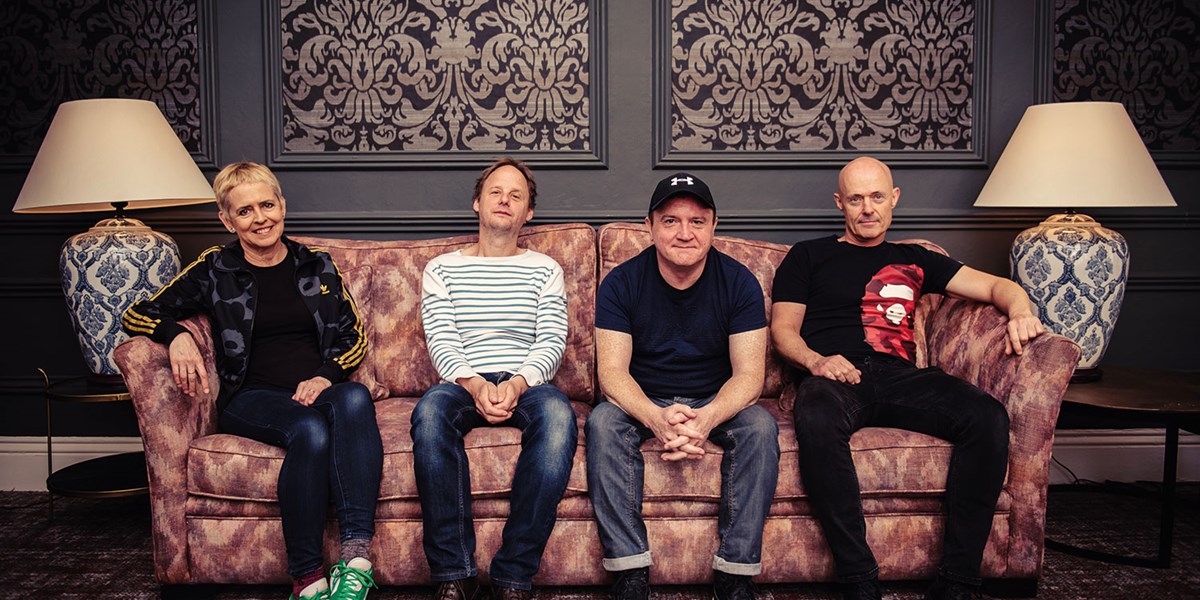Thursday, April 10, 2025
Still blowing minds: Flook’s 30-year journey
By Dave McNally
A surprise invitation led to the formation of a flute-focused Anglo-Irish group now celebrating 30 years. Dave McNally finds the secret to their enduring ingenuity

Flook (Eddie Kavanagh)
In the middle of 1995, promoter Becky Morris received a phone call asking if she could assemble a flute ensemble for an international flute festival later that year. The first name on her list was Michael McGoldrick, a flute, whistle and uilleann pipes player whom Morris had seen play when she was at school. Next came Sarah Allen, who had a classical background, but could play jazz too – Allen played accordion and flute in the eclectic folk band The Barely Works – and whom Morris knew through Allen’s group Big Jig. Rounding out the initial trio was Allen’s friend from Armagh, Brian Finnegan, a traditional Irish flute and whistle player who had stopped playing music to teach in Budapest. A phone call from Morris soon changed that.
Three Nations Flutes – a moniker stretching their Anglo-Irish reality – was the short-lived name Morris gave to the three chosen flute players, and, after she realised there was more to the group than a one-off festival gig, a short tour was organised for November 1995. Following a BBC Radio Folk on Two session in Birmingham, they played their first gig at Morris’ mum’s folk club in Chorlton, Manchester, before heading to the flute festival in London and finishing at Chestnuts Folk Club in Walthamstow. As novel as three flute players were, it was apparent after the first few dates that a different instrument was needed to anchor the rhythm. Guitarist Ed Boyd had become immersed in the traditional Irish session scene in Manchester, where he frequently played with McGoldrick. He drove from his home in Bath to play the last gig in Walthamstow and joined the band. “Immediately,” Finnegan remembers, “it all made sense.”
McGoldrick won the BBC Young Tradition Award just before the tour, which helped garner substantial interest from other festivals for the following year, including Towersey and Sidmouth, where their varied set was recorded for release as Flook! Live! in 1997. A restless McGoldrick departed later in 1997 to concentrate on other projects, initially leaving the remaining three in a quandary. The solution came in the form of bodhrán player John Joe Kelly, yet another product of Manchester’s flourishing Irish traditional scene. He had done one or two ‘Flook Big Band’ gigs, along with then Shooglenifty bass player Conrad Ivitsky. “You couldn’t really make it up, could you?” says guitarist Boyd when discussing their unusual line-up.
A first studio recording, Flatfish, arrived in 1999. The album was, the sleeve notes tell, “recorded at the beautiful, shabby, all-analogue Suite 16 Studios in Rochdale (the last band ever to do so, sadly) and mixed in the Big Room at Peter Gabriel’s Real World Studios.” Made with the revised four band members, Flatfish is, Allen says, having listened to it again recently, “so in your face, isn’t it?” The familiar, sparky Flook sound could be heard right from the first track and more than confirmed the veracity of their quirky instrumental mix.
Rubai, released in 2002, began a different approach to recording for Flook. It was recorded at Jethro Tull guitarist Martin Barre’s studio in Devon, with engineer Mark Tucker taking an active role and a rich variety of guest musicians: Martin Cradick (mandolin), Colin Farrell (fiddle), Seckou Keita (percussion), Rory McLeod (trombone) and Ewen Vernal (bass). Finnegan talks of “this golden sound” that Tucker produced. Three years later, it wasn’t broke and didn’t need fixing, so it was more of the same for the next album, Haven. Mark Tucker was again in the engineer’s seat, with Boyd assisting on the mix, and even more instruments, including banjo, concertina, harp and Hammond organ.
At the end of 2008, parental responsibilities for some led Flook to call it a day, explicitly leaving open the possibility that it could be “a prolonged pause” rather than a permanent split. They would reconvene five years later, effortlessly picking up where they left off on stage. However, it wouldn’t be until 2019, 14 years on from Haven, that the next album turned up. Ancora was, in many ways, of a piece with Rubai and Haven: same studio, same engineer, guests galore, but still thrilling, creative music.
Flook have never been the most prolific of bands recording-wise – they resolutely move at their own pace, rather than to any assumed industry norm, only recording when the time is right. Their 30th anniversary nonetheless gave them a good excuse to make a new album. Recorded in north London over three days, Sanju rings some changes. It is co-produced by Stevie J Jones (who had worked on Ancora) and John Calvert, both very familiar with the worlds of electronic and indie music. Unsurprisingly, Sanju does consequently sound different, richer and more ‘produced’, but it is still unmistakably Flook and as good as anything that came before.
Despite their musical roots being three-quarters in Irish traditional music and one-quarter classical and jazz, Flook’s tunes and inventive arrangements have, from the beginning, been altogether something else, contemporary but acoustic, by turns exhilarating and tender. Their choice of tunes is impeccable, gradually playing fewer traditionals, with tunes coming from present-day composers such as Zoë Conway, Colin Farrell and John McSherry, and increasingly from Finnegan and Allen themselves – always conveying a memory of someone or somewhere. Whether on stage or in the studio, Flook always sound wholly live, effervescent and quite irresistible.

